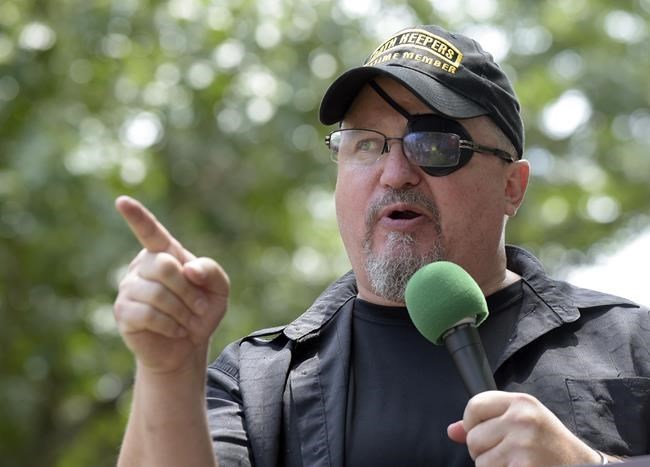WASHINGTON (AP) — Oath Keepers founder Stewart Rhodes took the witness stand on Friday in his high-stakes seditious conspiracy trial as he tries to counter allegations that his far-right extremist group planned an armed rebellion to stop the transfer of presidential power.
Rhodes began testifying after prosecutors spent weeks laying out their case against him and four others accused of a violent plot to keep Democrat Joe Biden out of the White House.
Rhodes' attorneys have signaled they will mount a novel defense with former President Donald Trump at the center. Rhodes is expected to argue that his actions leading up to Jan. 6, 2021, were in anticipation of orders he expected from Trump, a Republican. Those orders never came.
Rhodes’ decision to take the stand carries enormous risks and will open him up to fierce cross-examination by prosecutors, who will try to rattle him or catch him in a lie.
The trial is the biggest test so far for the Justice Department’s efforts to hold accountable those responsible for the attack on the Capitol, a violent assault that challenged the foundations of American democracy.
Prosecutors say Rhodes spent weeks mobilizing his band of extremists, stockpiling weapons and preparing for violence with the goal of stopping Biden from becoming president after the 2020 election. The plot came to a head on Jan. 6, prosecutors say, when Oath Keepers dressed in battle gear stormed the Capitol alongside hundreds of other angry Trump supporters to stop the certification of Biden’s electoral victory.
Rhodes, of Granbury, Texas, and his co-defendants are the first people arrested in the Jan. 6 attack to stand trial on the charge of seditious conspiracy. The Civil War-era charge, which carries a sentence of up to 20 years behind bars upon conviction, is rarely brought and can be hard to prove.
The others on trial are Kelly Meggs, leader of the Florida chapter of the Oath Keepers; Kenneth Harrelson, another Florida Oath Keeper; Thomas Caldwell, a retired U.S. Navy intelligence officer from Virginia; and Jessica Watkins, who led an Ohio militia group.
Rhodes’ attorneys have said that his defense will focus on Rhodes’ belief that Trump was going to invoke the Insurrection Act to call up a militia and put down what the extremist group leader viewed as a coup by Democrats.
Rhodes repeatedly called on Trump to invoke the Insurrection Act in the weeks leading up to Jan. 6, but Trump never did. Rhodes’ lawyers say he cannot be found guilty of seditious conspiracy because he was merely lobbying Trump to invoke the law, which gives the president wide discretion to decide when military force is necessary and what qualifies as military force.
Prosecutors are expected to highlight messages they say show that Rhodes was using the Insurrection Act as legal cover and was prepared to act regardless of what Trump did. In one message in December 2020, Rhodes wrote that Trump “needs to know that if he fails to act, then we will.”
Over more than a month of testimony, prosecutors have sought to show that the riot for the Oath Keepers was not a spur-of-the-moment protest but part of a serious, weekslong plot to stop the transfer of power.
They showed jurors surveillance footage from the Virginia hotel where the Oath Keepers stashed weapons for the “quick reaction force” teams that prosecutors say were prepared to get guns into the hands of extremists in Washington if necessary. Jurors saw a map Rhodes’ journey from his home in Texas to Washington before Jan. 6 that included multiple stops to buy an AR-rifle, magazines, ammunition and other equipment. The weapons were not deployed.
Defense attorneys say there was no plan to attack the Capitol. The Oath Keepers say they were in Washington on Jan. 6 not to stop the certification of Biden’s win but to provide security for right-wing figures such as Roger Stone.
Their attorneys argue the Oath Keepers regularly had a “quick reaction force” for events but the weapons were meant to be used only to defend against attacks from antifa activists or if Trump invoked the Insurrection Act.
___
Follow the AP's coverage related to the Jan. 6, 2021, insurrection at the U.S. Capitol at https://apnews.com/hub/capitol-siege.
Michael Kunzelman And Alanna Durkin Richer, The Associated Press




